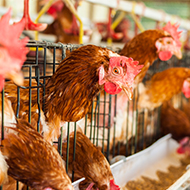Influenza A(H5N1) confirmed in 29 cats across the country.
The World Health Organization (WHO) has released a report confirming that 29 cats in Poland have tested positive for avian influenza A(H5N1). It is currently unknown how the cats, that were from a wide geographical area, were exposed to the virus.
Of the 29 infected cats, 14 have reportedly been euthanised, and a further 11 died.
The IHR National Focal Point of Poland notified WHO on 27 June 2023 of unusual deaths in cats across the country. Forty-seven samples have been taken from 46 cats and one captive caracal. Sixty-two per cent tested positive for avian influenza A(H5N1).
The symptoms that developed in some of the cats included breathing problems, bloody diarrhoea, and neurological signs, with rapid deterioration and death in some cases. In total, 20 cats had neurological signs, 19 had respiratory signs, and 17 had both neurological and respiratory signs.
Investigations into the source of infections are ongoing. It is thought that the cats could have had direct or indirect contact with infected birds or their environments, eaten infected birds, or eaten food contaminated with the virus.
Of the infected cats, where the information is available, two were outdoor cats, 18 were indoor with access to a balcony, terrace, or back garden, and five were indoor cats with no access to the outside environment. Seven cats are reported to have had the opportunity for contact with wild birds.
Cats have previously tested positive for influenza A(H5N1) in Poland, but this is the first report of high numbers of infected cats over a wide geographical area within the country.
None of the people who came into contact with the infected cats have reported symptoms.
Following exposure to infected cats, the risk of human infections to the general public in Poland has been assessed as low. The risk to cat owners and those occupationally exposed to infected cats without the use of personal protective equipment, has been assessed as low to moderate.
WHO are continuing to monitor the situation in collaboration with the animal and public health sectors, regional agencies, the Food and Agriculture Organisation of the United Nations (FAO), the World Organisation for Animal Health (WOAH), and other partner agencies in Poland.
The British Small Animal Veterinary Association said: “The World Health Organisation (WHO) indicates in their Report that although A(H5N1) infection in domestic cats has been confirmed in Poland, currently there are no reported instances of human infection with the A(H5N1) virus acquired from cats.
"BSAVA is supportive of the One Health approach that is part of the joint analysis by FAO, WHO and WOAH (the World Organisation of Animal Health- formerly OIE) which encourages collaboration between the animal and human health sectors, especially in the areas of information sharing, joint risk assessment and response.”
BVA president Malcolm Morley, said: “Cases of bird flu in cats and other carnivores have been reported before and the risk of transmission from cats to humans remains low.
"While the source of the outbreak in Poland is being investigated, our advice to pet owners in the UK is to take sensible precautions. Keep dogs away from any dead birds and, in areas where there is a large outbreak of the disease in wild birds, consider limiting where cats can roam. If you have any concerns about your pet, speak to your vet.”



 An Avian Influenza Prevention Zone (AIPZ) has been introduced across Wales.
An Avian Influenza Prevention Zone (AIPZ) has been introduced across Wales.